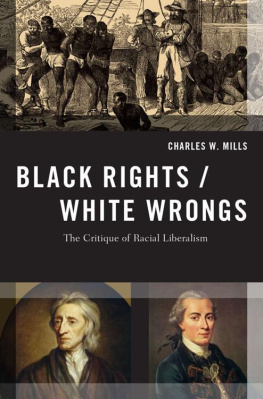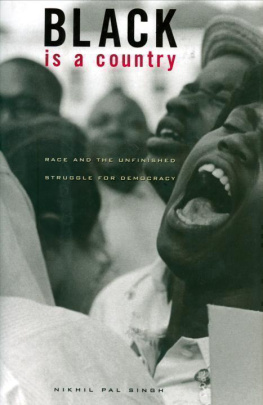Beyond Civil Rights
POLITICS AND CULTURE IN MODERN AMERICA
Series Editors: Margot Canaday, Glenda Gilmore,
Michael Kazin, Stephen Pitti, Thomas J. Sugrue
Volumes in the series narrate and analyze political and social change in the broadest dimensions from 1865 to the present, including ideas about the ways people have sought and wielded power in the public sphere and the language and institutions of politics at all levelslocal, national, and transnational. The series is motivated by a desire to reverse the fragmentation of modern U.S. history and to encourage synthetic perspectives on social movements and the state, on gender, race, and labor, and on intellectual history and popular culture.
Beyond Civil Rights
THE MOYNIHAN REPORT AND ITS LEGACY
Daniel Geary

Copyright 2015 University of Pennsylvania Press
All rights reserved. Except for brief quotations used for purposes of review or scholarly citation, none of this book may be reproduced in any form by any means without written permission from the publisher.
Published by
University of Pennsylvania Press
Philadelphia, Pennsylvania 19104-4112
www.upenn.edu/pennpress
Printed in the United States of America
on acid-free paper
1 3 5 7 9 10 8 6 4 2
Library of Congress Cataloging-in-Publication Data
ISBN 978-0-8122-4731-2
For my parents, Susan and William Geary
CONTENTS

INTRODUCTION

Crisis of Equality
In his 2006 bestseller The Audacity of Hope, Barack Obama praised the Moynihan Report, which famously predicted that female-headed families would impede African American progress after the passage of civil rights legislation. Obama repeated a common account of the controversy sparked by the 1965 report: Moynihan was accused of racism... when he raised alarms about the rise of out-of-wedlock births among the black poor. Responding to the most famous criticism of the reportthat it blamed the victimObama portrayed the uproar against Moynihan as a telling example of how liberal policy-makers and civil rights leaders had erred when in their urgency to avoid blaming the victims of historical racism, they tended to downplay or ignore evidence that entrenched behavioral patterns among the black poor really were contributing to intergenerational poverty.
By suggesting that African Americans take responsibility for their social advancement, Obama drew on a powerful interpretation of the Moynihan Report: urging racial self-help. [A] transformation of attitudes has to begin in the home, and in neighborhoods, and in places of worship, he argued.
Responding to Obamas comment, prominent African American commentator Ta-Nehisi Coates was outraged that the president pointed his A half-century after its publication, the Moynihan Report remains a contested reference point for debating the causes and cures of African American inequality. The controversy endures because it elicits competing explanations for why African Americans, despite ostensibly having equal civil rights, experience a standard of living significantly lower than that of other Americans.
Officially titled The Negro Family: The Case for National Action, the report was colloquially named after its author, Daniel Patrick Moynihan, then a member of President Lyndon Johnsons administration. Moynihan wrote at the dawn of a new era in American race relations: landmark legislation in 1964 and 1965 ended Jim Crow segregation, granted formal equality to African Americans, and discredited overt arguments for white supremacy. Yet Moynihans opening sentence warned, The United States is approaching a new crisis in race relations. The crisis, he wrote, resulted from African American demands that went beyond civil rights to include economic equality. Moynihan responded to civil rights leaders who had long advanced economic reforms designed to ensure a basic standard of living for all Americans. The 1963 March on Washington, after all, was for jobs and freedom. Yet Moynihan worried that achieving full racial equality would be hindered by what he viewed as the crumbling and deteriorating structure of many African American families reflected in high numbers of out-of-wedlock births and female-headed families. Family structure stood at the heart of what he notoriously labeled a tangle of pathology evident in high rates of juvenile delinquency, drug abuse, and poor educational achievement among African Americans. Moynihans thesis produced conflicting notions about how to combat racial inequality. For liberals, it suggested the need to provide jobs for black men to stabilize families. For conservatives, however, it suggested the need for racial self-help: for African American leaders to morally uplift blacks by inculcating family values.
The Moynihan Report sparked an explosive debate at the intersection of competing conceptions of race, gender, and poverty. The political dispute over the document was actually a short-lived affair. Moynihan finished the report in March 1965. In June, it served as the basis for a major speech by President Johnson. In August, it became public. By November, the Johnson administration had disowned it in the face of mounting criticism. From the left, critics charged Moynihan with blaming the victim: by shifting attention to African Americans alleged family problems, he overlooked the institutions that oppressed them. Though the report lost direct relevance for public policy after 1965, intellectuals and political activists hotly debated it well into the 1970s. In the mid-1980s, the report witnessed a political and media revival that never fully dissipated. Even today, as Obamas and Coatess remarks suggest, it remains a litmus test for revealing an individuals political beliefs.
Beyond Civil Rights diverges from prevailing accounts of the Moynihan Report controversy that focus on establishing the documents intended meaning. Some scholars claim the report was a conservative document that reinforced racist stereotypes. Others defend it as a quintessentially liberal document, arguing that critics simply misunderstood it. In contrast, I argue that the report had multiple and conflicting meanings. It produced disparate reactions because of internal contradictions that reflected those of 1960s liberalism and because of its contentious assumptions about race, family, poverty, and government. Instead of focusing solely on Moynihans intentions, this book explains why and how the report became such a powerful symbol for a surprising range of groups including liberal intellectuals, Southern segregationists, civil rights leaders, Black Power advocates, feminists, neoconservatives, and Reaganite conservatives.
One prominent interpretation finds that the Moynihan Report pioneered using images of matriarchal African American families to undermine the welfare state, an effort that accelerated during the 1980s and 1990s with Republican attacks on welfare recipients, usually pictured as African American single mothers. For example, scholar Roderick Ferguson writes that the report facilitated a conservative blockade of social welfare policy through its pathologizing of black mothers.By contrast, in the 1960s, many interpreted Moynihans emphasis on social pathologies to indicate the need for unprecedented national action. Civil rights leader Martin Luther King, Jr., and socialist Michael Harrington both hailed the report; seeing it as inherently conservative makes it impossible to understand why.
Next page






